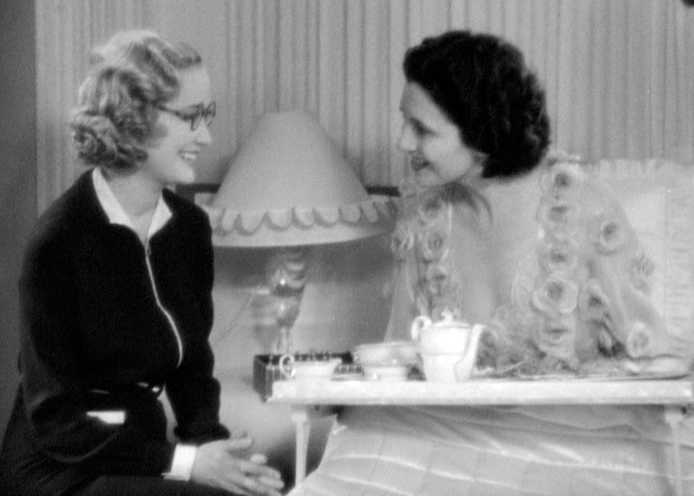Trouble in Paradise, 1932, Paramount Pictures. Starring Miriam Hopkins, Kay Francis, Herbert Marshall. Directed by Ernst Lubitsch. B&W, 83 minutes.
Gaston Monescu (Herbert Marshall), a gentleman thief with an international reputation, has met and fallen in love with a sly, beautiful pickpocket, Lily Vautier (Miriam Hopkins). The two are as skilled in the manners of the nobility they are stealing from as they are in thievery, and they wind their way into the life of elite perfumery owner Mariette Colet (Kay Francis).
Soon, Gaston is Mariette’s secretary and chief confidante. He is planning a large heist of her fortune, but two problems loom: he is close to being recognized as a thief by one of his former victims—a suitor of Mariette’s, it turns out—and he is falling for the lovely Mariette.
His choice is determined in part by factors unforeseen and circumstances unexpected, as well as matters of the heart.

Miriam Hopkins, Herbert Marshall
Trouble in Paradise proved to be problematic with censors after the production code was implemented, and they refused to allow the film to be re-released in 1935. As a result of their tight restrictions, it wasn’t seen by the public again until 1968.
This was the film that was first associated with the phrase, “the Lubitsch Touch,” one of the most successful spin of words in film history. That “touch” has been described by numerous film historians over time, one of the most succinct and spot-on being, “A subtle and souffle-like blend of sexy humor and sly visual wit,” by Roger Fristoe, film critic.
The dialogue was sharp and witty, fast-paced yet sometimes subtle, but it wasn’t the only element that moved the story forward with such devilish style. Lubitsch made good use of props, integrating them into the story seamlessly and often, for a good laugh. His attention to detail in every scene creates a cohesive, sleek film.

Miriam Hopkins, Kay Francis
A good deal of the sauciness of the screenplay came from the real-life memoirs of a notorious Hungarian thief, Georges Manolescu, titled A Prince of Thieves. Those memoirs held so much juicy material they inspired several films in the 20s and 30s. At that time and in the country they were published, it was legal to profit from the re-telling of one’s crimes, and Manolescu made a tidy sum with his books.
Whether it’s due to the era of film making in which it was created or simply the style of the film itself, Trouble in Paradise is dated and therefore, somewhat of an acquired taste. However, the quality of the script and yes, the Lubitsch touch, make it worth the watch for fans of subtlety, sophistication and style in films.

Brilliant film. Marshall is superb in this and looks so handsome. I wish they had made a sequel about further adventures of Gaston and Lily.
LikeLiked by 1 person
That would have been fun! And I agree, he looked very handsome.
LikeLiked by 1 person
Have never seen the film. Your review makes me look forward to catching it and also grateful for the interesting side note on Hungarian thief, Georges Manolescu…fascinating! Thank you for another wonderful review.
LikeLiked by 1 person
This is probably my favorite Lubitsch movie. You really have to pay attention (some of the jokes are very, very subtle). Count me as a big fan of “the Lubitsch Touch.” 🙂
LikeLiked by 1 person
It took me three times to get into it, but then I couldn’t stop watching it. Each time I caught something new…you’re right, very, very subtle, and very, very funny.
LikeLike
[…] Wait is humor of a different sort for Ernst Lubitsch. It doesn’t hold the biting sexuality of Trouble in Paradise or Design for Living, and its lead character is an ordinary, unremarkable man. But like many of […]
LikeLike